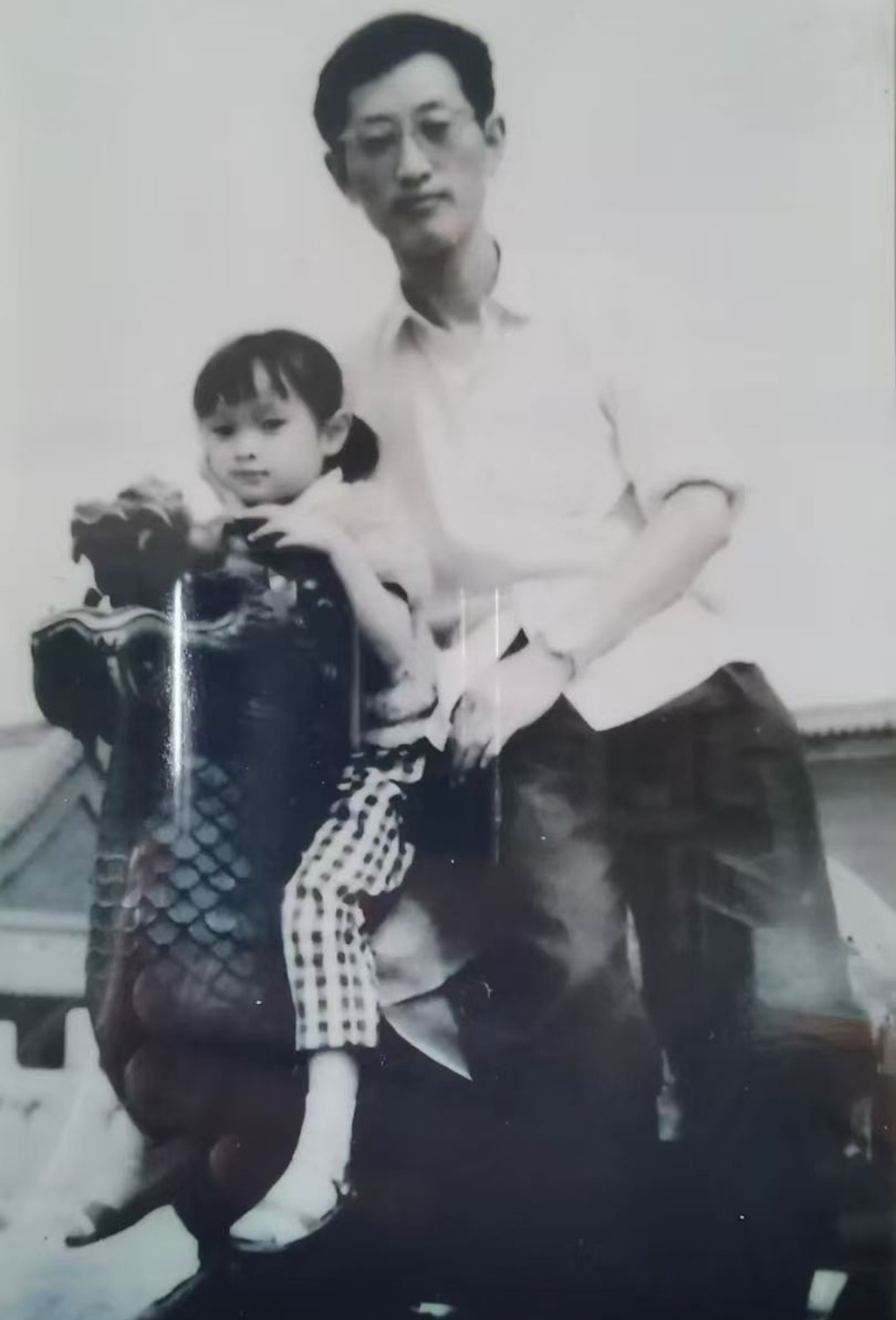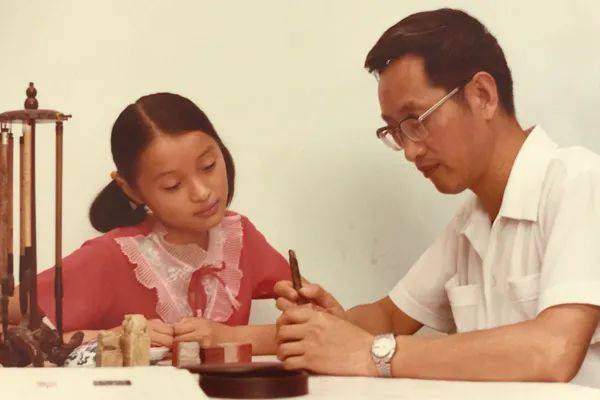
The TV series "The Silent Glory" recently concluded, with renowned actress Wu Yue's portrayal of Zhu Feng once again winning praise from audiences. Watching her precise and expressive performance on screen, I couldn't help but think of her father, the renowned calligrapher and seal engraver Mr. Wu Yiren, who has worked tirelessly behind the scenes and is also my mentor. This feeling inspired me to write about the artistic legacy between Mr. Wu Yiren and his daughter, and a story of mentorship spanning forty years.

A photo of Wu Yiren with Wu Yue as a child playing in the park.
Artistic Passion Between Father and Daughter
On February 19, 1985, the eve of the Lunar New Year, introduced by my classmate Shen Yongming, I cycled two hours from Qingpu to Xinzhuang to visit my teacher, Wu Yiren. In my memory, Wu Yue was still a little girl with pigtails, bouncing around. Who could have imagined that that innocent figure, encouraged by her father, would embark on a journey north on a green train to attend third grade? That year of studying in Beijing not only honed her independence and steadfast character but also laid a solid foundation for her future artistic path.
In fact, Wu Yue began learning seal carving and calligraphy under her father's guidance when she was five or six years old. The strong artistic atmosphere in her family gave her opportunities to be exposed to these traditional arts from a young age. She showed considerable talent in seal carving, winning a gold medal in the junior group of a national seal carving competition in her second year of junior high school. Mr. Wu Yiren also taught his daughter seal carving techniques and methods. Besides calligraphy and seal carving, Wu Yue also learned dancing, piano, and violin during her childhood, which cultivated her artistic temperament. Mr. Wu Yiren not only emphasized artistic cultivation but also valued his daughter's character education. He once advised Wu Yue to "know how to be grateful," a principle that has become Wu Yue's guiding principle in life.

Under her father's guidance, Wu Yue studied seal carving and calligraphy.

A photo of young Wu Yue and his mother.
Despite having already achieved some success in seal carving and calligraphy at a young age, Wu Yue ultimately chose a different artistic path from her father—acting. In 1991, she was admitted to the Shanghai Theatre Academy with the highest score in her major. After graduating, she became an actress, and in recent years her acting roles have become increasingly diverse and impressive.
I often joke with Mr. Wu Yiren, "When Wu Yue was young, people introduced her as Wu Yue, the daughter of the famous calligrapher and seal engraver Wu Yiren; now that she's grown up and achieved success, people introduce her as 'Wu Yue's father, the famous actress Wu Yue, a calligrapher, painter, and seal engraver Wu Yiren.'" Mr. Wu Yiren laughs heartily, but he feels incredibly proud and gratified—having successful children and a happy life is probably the greatest joy for any parent.

A photo of Wu Yiren and Wu Yue taken during Wu Yiren's 70th Anniversary Exhibition of Calligraphy, Painting and Seal Carving Art in the Golden Autumn of Ren Chen Year (2012).
Mr. Wu Yiren's Exploration of Art
Wu Yiren was a highly accomplished artist in numerous fields, including calligraphy, seal carving, traditional Chinese painting, purple clay and porcelain art, as well as teaching and writing. His artistic language blends the ancient and modern, forming a unique style. His calligraphy, guided by masters such as Luo Fuyi, Qian Shoutie, and Qian Juntao, drew inspiration from Chu bamboo slips, Han bamboo slips, and Han steles, resulting in a style that is both ancient and innovative. In his later years, he further incorporated cursive script, ancient Naxi script from Yunnan, and the brushstrokes of Japanese kana into his creations, expanding the expressive dimensions of calligraphy and creating his distinctive "Wu Family Han Bamboo Slips" style. His related works include *Wu Yiren's Han Bamboo Slips Calligraphy* and *A New Compilation of Wu Yiren's Han Bamboo Slips Calligraphy*, which systematically organize his explorations in Han bamboo slip script.

Wu Yiren's calligraphy works

Wu Yiren inscribed the name of Shen Kiln.
In seal carving, he drew inspiration from Han Dynasty seals and absorbed the essence of masters such as Wu Changshuo, Qian Shoutie, and Lai Chusheng. He particularly excelled in incorporating Han Dynasty bamboo slips into his seals, creating a unique style. His book, "Fifty Lectures on Seal Carving," is hailed as the best introductory book of the 20th century. It is comprehensive in structure, clear and concise in language, and has had a profound and far-reaching influence. "The Method of Seal Carving" is a valuable guide, systematically explaining the techniques and theories of seal carving and providing solid guidance for future learners.
Wu Yiren began painting after the age of fifty, inheriting the freehand style tradition of Wu Changshuo, Qi Baishi, and Li Kuchan. His subjects are mostly poetic scenes and everyday life elements such as flowers, birds, insects, and fish. He incorporates the brushwork of Han Dynasty bamboo slips into his paintings, supplemented by his profound seal carving skills, resulting in works full of rich epigraphic quality. In his Zisha (purple clay) creations, he personally paints and writes while also carving with a knife, using the knife as a brush. The flying sand and stones create a seamless integration of brushwork and carving on the pottery, achieving a high degree of unity between conception, form, and knife technique, showcasing an elegant and profound artistic character.

Wu Yiren's paintings
In the field of porcelain art, during his time at the Shen Kiln, he combined traditional painting with kiln-transformation glazes, resulting in works that were dazzling and varied. He also incorporated elements such as Qin imperial edicts, rock paintings, and Naxi script into his porcelain, imbuing them with profound cultural connotations.

Mr. Wu Yiren's calligraphy on Han Dynasty bamboo slips began with his deep fascination with the styles of Wuwei and Juyan, and through continuous innovation, he developed his own unique style. I am deeply grateful to him for his kindness; before I moved, he specially commissioned a bamboo slip copy of Su Shi's "Nian Nu Jiao: Reminiscences of Chibi" for my Chuiyulou Study. I cherish it dearly, hanging it in my study to admire every day, reading it endlessly without ever tiring of it!
Like a strict teacher and a loving father, the torch is passed down from generation to generation.
For over forty years, every time I visited Master Wu Yiren for guidance, he would always put aside his work to meticulously instruct me on the exercises I brought; every time I parted, he would personally see me off. He gave me an artistic name, changing "Jinping" to "Jingpin," bestowing upon me the studio name "Master of the Hall of Heroes," and naming my Yan Shuzhai "Chuiyulou." He even carved a seal for my registered trademark "Shenyao," and wrote an epitaph for my deceased mother. In that era of correspondence, the dozens of handwritten letters Master Wu gave me are now well-preserved and have become the most precious collection of "Chuiyulou."

Wu Yiren engraved the registered trademark for "Shen Kiln".
Teacher Wu's kindness towards me has extended to my family. From the schoolbag and stationery my daughter Mingliu used when she started school, to the specially made souvenirs for her 18th birthday, to the blessings she insisted on delivering in a wheelchair at her wedding, Teacher Wu's care has always been there. Before the Jia Chen Tian Kuang Festival, my grandson Tiankai was born. Teacher Wu happily instructed me to buy baby supplies—little hats, little shoes, little socks—and specially selected children's toys to send over. She also shared her successful experience in raising Wu Yue with me, earnestly teaching me: "Love without spoiling, focus on daily life, and cultivate good habits from a young age."

A gift created by teacher Wu Yiren for my daughter's eighteenth birthday

Wu Yiren's porcelain artwork "Peace of Mind and Long Years" created at Shen Kiln.

In the autumn of 2000, Wu Yiren specially commissioned a large painted jar for the artist at the Shen Kiln.
I remember more than twenty years ago, when Wu Yue had just graduated from the Shanghai Theatre Academy and was filming by Dianshan Lake in Qingpu, I treated her to a meal as a local and drove her to the airport. On another occasion, I took my whole family to visit my teacher, Wu Yiren. My daughter wanted to meet her idol, the "celebrity sister" Wu Yue, so I contacted her. I thought she would be too busy to come, but she arrived early at the White House Restaurant, where we had arranged to meet. When my daughter called her "big sister," she playfully corrected me, "What big sister? You should call me 'little aunt'!" This kindness is unforgettable.

Wu Yiren's works
In recent years, her teacher's health has been poor, and Wu Yue's filial piety has been deeply moving. During the sweltering heat of the Jia Chen year (2014), she personally moved the study to her father's new home, her clothes soaked with sweat as she meticulously arranged every book and every piece of porcelain. Her teacher's wife, Ms. Lu, pointed to the bookshelves and told me, "Every book, every piece of art was arranged by Xiao Yue herself." From that little girl with pigtails who went north alone to become a pillar of support for her parents, this scene is not only deeply touching but also a heartwarming testament to the enduring legacy of a good family tradition.

A photo of Ke Wenhui (center), Wu Yiren (right), and Luo Jingpin taken in the ancient town of Zhujiajiao in early summer of 1999.
Forty years have passed in the blink of an eye. I have grown from a naive young man to a man with a large family. Teacher Wu Yiren has warmed the growth of three generations of us with his broad and delicate care. He is not only a calligrapher, painter and seal engraver with a unique style, but also a successful educator. The widespread recognition that Wu Yue received in "The Silent Glory" is the best proof of his educational wisdom.

The author of this article, Luo Jingpin (right), visits Professor Wu Yiren at the Minhang Hospital's Little Red Building.
(Note: All images in this article were provided by the author.)